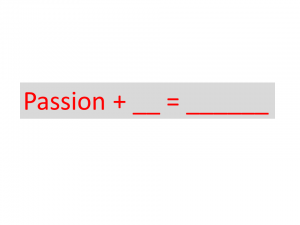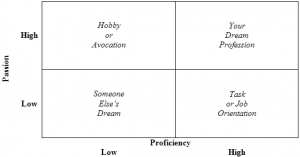How many times have you heard the advice “follow your passion” in the quest for career happiness? On the surface, it is very logical- why not do what you love? In a world that tells us YOLO- pursuing our passion makes a lot of sense. Evidence abounds that too many Americans are discontent with their careers. One study revealed 71% of workers are not engaged with their jobs, and another study found 80% do not like their jobs (Efron, 2013). These statistics offer compelling reasons to put a premium on following your passion to find happiness in the workplace.
The Trouble with Following Your Passion
Until recently, I wholeheartedly subscribed to the follow-your-passion mantra. Now, I find myself pulling back, qualifying it as being part of the equation in building a great professional brand. In fact, some people would downplay the role of passion even further. In his book So Good They Can’t Ignore You, Cal Newport suggests rather than following your passion, you should seek to nurture it so that it becomes an offshoot of what you do. So rather than passion driving choice of profession and work, it arises from them. Newport also favors a craftsman-like mindset over being a lover of your field. The reasoning is a high level commitment to creating quality work will build passion for what you do.
Passion is an input, not the sole determinant of brand strength or quality. Building on Newport’s focus on quality, my take is:
Passion + Proficiency = Professional Brand Equity
Proficiency is the composite of our capabilities- the education, training, skills, and behaviors that you can perform.
Where Are You?
Below is a 2 x 2 matrix that categorizes professional brands based on one’s passion (emotional drive or motivation for a pursuit, activity, or job) and proficiency (capability to produce quality results related to a pursuit, activity, or job). The ideal quadrant is the upper right (high passion/high proficiency). When you operate in this space, work does not seem like work- it is truly a joy to be in your chosen field. The other three quadrants are problematic in their own way, with the lower left quadrant (low passion/low proficiency) being the worst possible situation. You do not want to be there; either circumstance or someone else put you in that place.
The other two quadrants call for reflection and evaluation if you are in one of them. For the upper left (high passion/low proficiency), can my passion be leveraged for a career opportunity? If yes, what skills or knowledge am I lacking needed to move to the upper right quadrant? The lower right quadrant is likely where many people among the 80% who do not like their jobs can be found. They are proficient in the field in which they work, but they are not driven by their passion nor finding passion in what they do.
Do the Math
Use the equation of Passion + Proficiency = Professional Brand Equity as a guide for managing your professional brand. Do not dismiss the importance of passion, but at the same time do not blindly put faith in your passion leading to career success.


